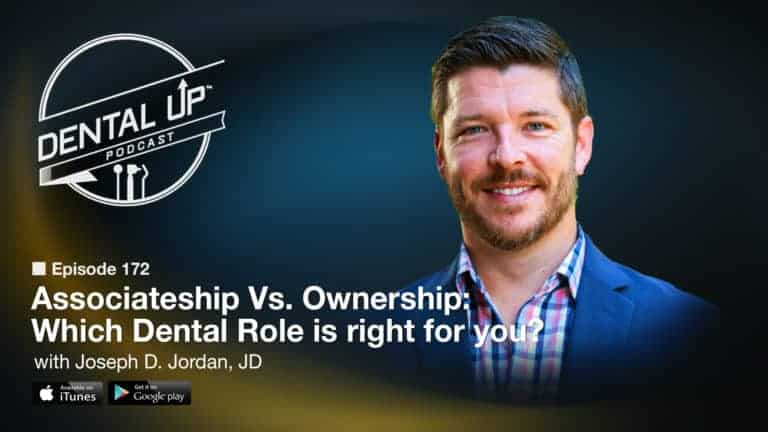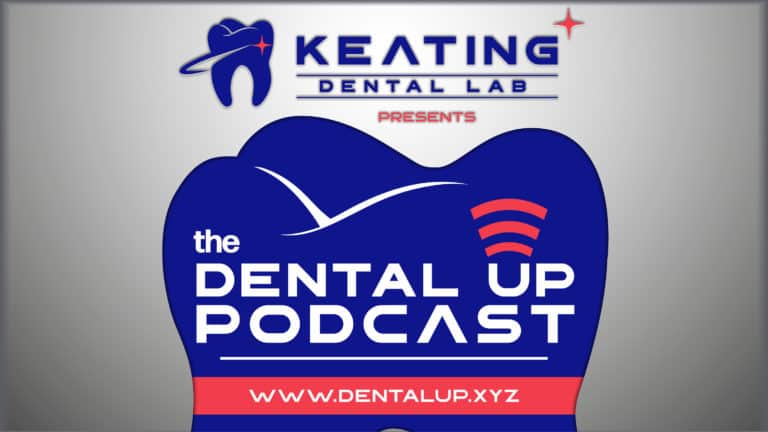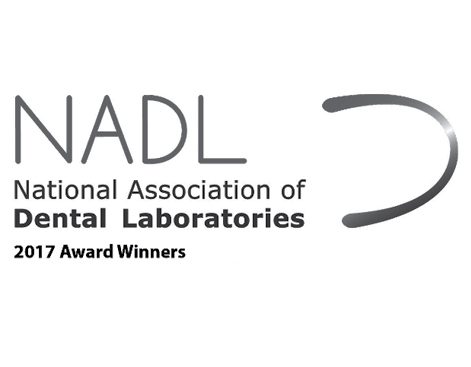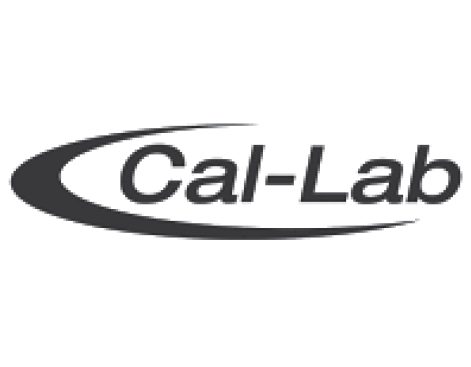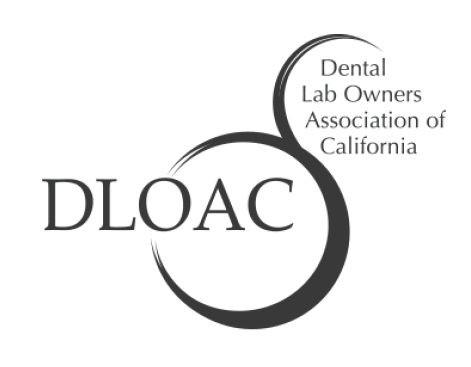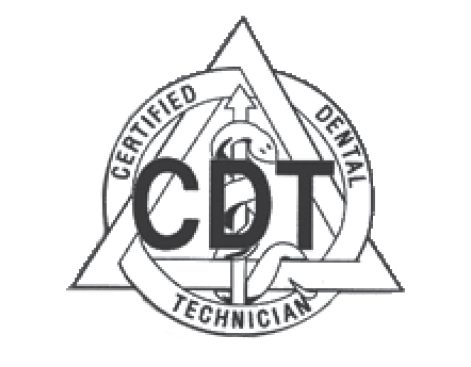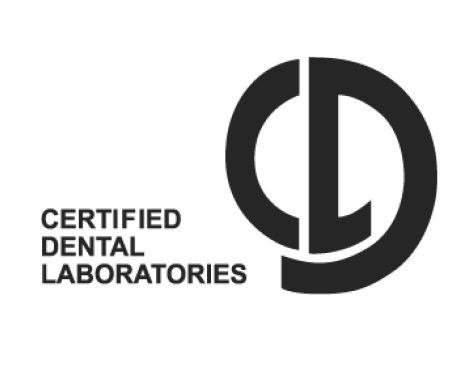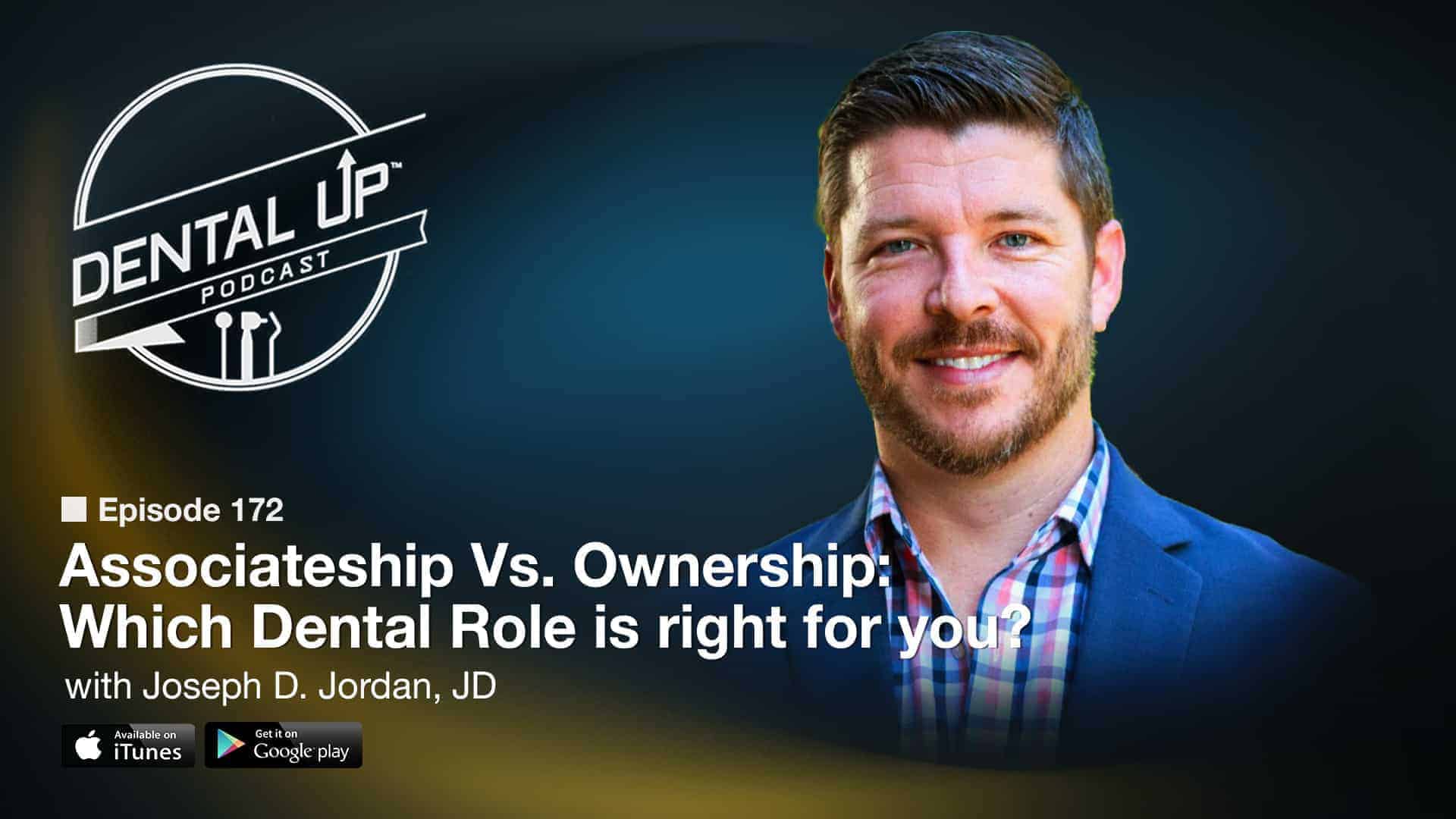
![]()
![]()
![]()
![]()
![]()
Our guest this week Joseph D. Jordan, JD sits down with Shaun Keating and discuss the power of good mentorship and the positive benefits it brings to your personal and professional life. They also talk about how Joseph helps recent graduates plan for their future by figuring out what is the best financial options that younger dentists need to take in their first year after graduating. Finally, he explains why going back to your hometown after graduating and associating could be a big mistake. You will hear all this and more on this week’s episode of The Dental Up Podcast.
On this episode you will hear about:
-It’s not what you know its who you know… look for mentorships
-Biggest mistake is dentists trying to do everything themselves.
-Look out for the Restrictive Covenant Agreement
-Common mistakes for dental practice buyers.
-Why planning is very important the first year after graduating dental school
-It’s ok not to be an owner.
For more information on Joseph D. Jordan and his company feel free to check out the following links down below:
Website: https://www.jpatransitions.com or http://dental.law/#!/section/home
Facebook: http://bit.ly/33lmS2V
Instagram: https://www.instagram.com/jpadentaltransitions/
[bg_collapse view=”link” expand_text=”View Full Transcript” collapse_text=”Hide Transcript” ] Host: Ladies and gentlemen. This is the Dental Up Podcast brought to you by Keating Dental Lab, a full service award-winning dental laboratory. Each week you’ll learn tips and techniques from a real world dentists. Bringing you in-depth interviews, motivating stories, current events and sports. Here’s your host, Shaun Keating. Shaun Keating: Hey everyone. Shaun here, welcome to another episode of the Dental Up Podcast. Our guest this week received his Juris Doctorate from Adrian Norman Wiggins school of law, at Campbell University. He later started Jordan Law Group, and he is currently a partner at JPA Dental Transitions. Currently practicing from Belmont North Carolina. Please welcome, Joseph D. Jordan. JD, how’s the going Joe? Joseph Jordan: Doing well Shaun. I appreciate you having me on. Shaun Keating: Oh man, it’s cool dude. You’re probably the second guy that I’ve had on, that’s not a dentist, but your business relates to the dental industry. And I think it could help some of our younger dental students that are just finishing up dental school, and, or have been in the field for a few years. But they have all this student debt, and I think you guys have some things going where you can help them out in certain situations. Shaun Keating: But, I’m excited about it and hopefully we can get a couple pearls out of this, and get it to some of our dentists that are loaded with debt. Because men, we know how much it costs nowadays, and dude, it’s so tough. But anyways, I always like to start off talking a little bit about sports. So you’re a North Carolina guy, man, you like those Panthers out there, or what? Tell me a little bit about [crosstalk 00:01:47]. Joseph Jordan: Oh, yeah, we have the panthers out here. Hopefully one day we’ll decide to do something with them. We get so close, they call us the Cardiac Cats for a reason. I’ve got a lot of friends that just get really emotionally involved. I used to, but I gave it up, I just couldn’t handle it anymore. I’m getting too old for that. Shaun Keating: Oh, no. Joseph Jordan: But maybe one day, we’ll bring back Super Bowl. They’re a strong team, they do a lot of good stuff. They just can’t seem to keep it together long enough to get us to the finish line. I mean, [inaudible 00:02:14] was it that couple of years ago, we had almost an undefeated season, one loss, and of course it was the most important loss. That’s just kind of the way we go out here, for some reason. Charlotte is yet to bring back any type of championship on the pro level. So, maybe one day. Shaun Keating: Well, I know it’s real big. My brother and my son actually, both live in North Carolina, over in Greensboro, but it’s something that I know the whole state of North Carolina… well, it’s not in South Carolina, is the stadium or no. It’s in rally I think, [inaudible 00:02:46] or where’s the stadium at for?- Joseph Jordan: There’s the Panther Stadium was in Charlotte. Shaun Keating: Charlotte. Joseph Jordan: Yeah. Technically the Panthers they represent North and South Carolina, we just got Carolina Panthers. So it’s right in the middle, Charlotte’s got as much North Carolina over it as it does South Carolina under it. Shaun Keating: Perfect. And, is it like [inaudible 00:03:04] Rivera the head coach or no, is he still, or? Joseph Jordan: Yeah. Rivera is still the head coach. And look, the guy does a pretty good job. I mean, they’ve had a heck of a number of seasons under him. So I think we plan on keeping him around. They did just have an ownership change recently, and for some reason, I can’t remember the guy’s name that bought them out. But I think we’re in our second season under new ownership from [crosstalk 00:03:28] level. Shaun Keating: Okay. That’s usually a good thing, because you usually come in and want to improve things. And the dude that’s [inaudible 00:03:33] nowadays, I mean, that guy’s got to be loaded with cash, because it’s like- Joseph Jordan: Anyway. I mean, he literally bought it by himself. Shaun Keating: Can you believe that? Joseph Jordan: You know one of those guys, just wrote a cheque. Shaun Keating: That’s like the dude that bought our Rams, [Sam Cranky 00:03:45], or whatever his name is. That dude is so darn rich, and then he married like the highest, the top persons at Walmart, I think [inaudible 00:03:55] where like … Joseph Jordan: Just keep mounting it up. Just keep it coming. Shaun Keating: It’s just so nuts. I always dreamed when I was little kid, I was in a football, and I was wanting to buy a football team when I got older, if I get successful. Back then you could have bought, Rams or these teams were like 20, $30 million, and you get a pool of investors with you, and you can make it happen Kind of. But now- Joseph Jordan: [inaudible 00:04:18] the billions. Shaun Keating: Yeah, big time billions. And we’re like 32 owners out there, and you get vetted so tough to get into that good old boys club, I guess. But there’s a few women, I think there’s a woman that owns a New Orleans Saints, and the New Orleans Pelicans or something like that. But, they’re [crosstalk 00:04:39]- Joseph Jordan: Yeah, a lot of money in that organization. Shaun Keating: Yeah, they’re totally blessed man. But it’s kind of cool, because the Rams actually open up with you guys, September… I don’t know. It’s August 9th, I think, August 8th. Sunday, August 8th, at 10:00 AM baby, at Fox channel 11, and they’re going to be- Joseph Jordan: Yeah, we’ll see what Cam does. Which Cam shows up on the field. Shaun Keating: Yeah. It’s kind of weird with Cam. I mean, he’s such a talented quarterback, really is. And you guys have always had such a stead defense with Rivera. I mean, he’s a defensive guru for sure, but they kind of fell off. And Cam was kind of erratic and I heard they’re kind of going through his whole throwing motion, and trying to reinvent him a little bit differently. And instead of trying to do [crosstalk 00:05:21]. Joseph Jordan: You know how that usually turns out for quarterback, not real well. Apparently, he has shoulder issues, and we keep downplaying him. We keep talking about, he’s got surgery, and then he’s fine. Then he need surgery again, and then he’s fine. So to be honest with you, I don’t think anybody other than Cam and Rivera know what’s going on, but we’ll see. But you’re right, super talented guy, comes out, and can just absolutely dominate the field, or can come out and just not even put a pass together. So we’ll see which one’s playing this season. Shaun Keating: He’s so dynamic. Kind of remind me of a Michael Vick way back in the day, where he passes, but yet he’s more of a threat almost when he’s running. I mean the dude’s … Joseph Jordan: Absolutely. [crosstalk 00:06:02] got legs on him. Shaun Keating: And totally and then, he likes to get in there, and put the head on these big old… because he’s bigger than most linebackers and stuff. Cam Newton is as a specimen for sure. But you can’t do that in the NFL. Joseph Jordan: Yeah, he is a big old guy. Shaun Keating: Yeah. Joseph Jordan: That’s right. You can’t be a quarterback and try to protect yourself enough to keep playing as a quarterback, and go up against those big old guys. Shaun Keating: Exactly. But, yeah, I watch a little bit of him on ESPN yesterday on the team, and they look like they’re going to be after it. The Rams, being in the Super Bowl, every game they’re up against, these guys are going to try to take their heads off. You never know, the Rams might not be as great. We’ve got some new guys on the [inaudible 00:06:39] line and a couple other areas that… In Linebacker, we got Clay Matthews, we got from Green Bay came on home. Joseph Jordan: Yeah, I saw that. Shaun Keating: He’s like over the hill, they’re all saying and he’s like, he’s 33, he’s so young. But in the NFL, that’s like 63, but so not good for you man and I hope you Carolina Panthers don’t win, but I hope they do well for the rest of the season. As long as it’s not [crosstalk 00:07:05] around. Joseph Jordan: Yeah. Maybe we’ll put something together this year. We’ll see. Shaun Keating: Yeah. Well, I’m hoping you guys have it, because there’s not a whole lot out there you guys got to look forward to when it comes to Pro Sports, the Carolinas. Joseph Jordan: No, we go the college locked up. We got college sports locked up, but we just can’t seem to get our act together when it comes to the Pro [inaudible 00:07:22]. Shaun Keating: Oh, I know. And now college is where [inaudible 00:07:25] too. It’s just there’s such a passion and love for the game, and I just love … I always wanted to say, I want to do like with the football seasons, college and pro. I’d just love to go across the US, and just hit all these different NFL games. Joseph Jordan: The [inaudible 00:07:40]. Shaun Keating: The [inaudible 00:07:40], the Texas Longhorn, check out some of them. Oklahoma Sooners and like even do some basketball in North Carolina Tar Heels, and just all the different. It’s just a such a fun thing. Then we get to go out, and drink beer, and go to the pizza parlors, and stuff, is what we do at out here in [inaudible 00:07:56] but … Joseph Jordan: [inaudible 00:07:58]. Shaun Keating: Well, hey, there’s also this one thing, my guys used to give me some little current events and stuff. So this little 16 year old dude, and I guess there’s a video game called Fortnite? Joseph Jordan: Fortnite, yeah, what? He just won $3 million? Shaun Keating: $3 million, that little 16 year old. Joseph Jordan: [inaudible 00:08:12] million dollars. Listen, when I was playing Atari and Nintendo, if I had only known, if I had focused harder that I could win $3 million. Shaun Keating: Exactly, or Mario Bros, man. Always trying to get Mario, to eat him up, or whatever it was, I hit him with a hammer. Now that’s so cool. Joseph Jordan: [inaudible 00:08:32]. Yeah, $3 million, that’s unbelievable. I didn’t even know there was that. I’ve heard just in the news that there are pro video game competitions, but I had no idea there was that kind of money backing it. Shaun Keating: Oh yeah. There’s like a whole thing and the colleges are starting for gamers, and they got blizzard and some of the bigger companies out here in Orange County area, and it’s a big thing. But my kids, whenever I seen them in there on that inner web, or the video game, I say, “Get off your ass, and get out in the yard, and go throw a ball. Get off those video games.” Joseph Jordan: [crosstalk 00:09:08] self. Shaun Keating: They’re not going to do nothing but sit there, but then again, look at they gave away $30 million in this World Cup, Fortnite World Cup, celebrities [crosstalk 00:09:18]. Joseph Jordan: Crazy, I know you are going to be telling them to get back, and start playing some more video games. Shaun Keating: Exactly. I bet you’re, so many parents, like millennial parents, and just some of the newer parents out there, they’re probably going push their kids towards it. And it’s like, I just don’t … putting your ass on that chair all day, and looking at a TV and doing that stuff, but- Joseph Jordan: Yeah. Pressing buttons. Shaun Keating: … yeah. Fricking nuts. I could never get it, I just wouldn’t. I don’t know what it was, is just not smart enough to know all the … you go read the book and all the tricks, but you’re not supposed to do it. You’re supposed to learn it naturally somehow. But, I know they could get it naturally. My boys, whenever I tried to play [inaudible 00:09:55] above and beyond my head man. Joseph Jordan: Oh, yeah. No, it’s way past my talent range. Shaun Keating: Yeah. You just never know, growing up too. And I’m so glad, like you man, you went to law school, and just other kids, even when you’re in high school towards the end, your counselors are trying to find out, “What are you going to do.” And it’s tough, and even going to college. All you guys that went to college, you get done, you get your degree and now are you going to do anything in that field, or? You don’t know what it is, but I’m just glad I don’t have to do it man, because- Joseph Jordan: And trust me, I’m glad it’s behind me. Shaun Keating: A lot of things [crosstalk 00:10:34]. Joseph Jordan: I see a lot of my friends, their children are getting into college, or coming out of college, or trying to decide what they want to do, and everybody’s asking advice. And it’s one of those things where looking back, you can always… just like everybody did for me and probably for you. Everybody’s got advice to give, but you have to make your own decision, and go your own direction, because it’s one of those things, the best advice in the world is never applicable when you hear it. It’s always later that it makes sense. And that’s one of the, I guess the great ironies of life is, you could literally avoid the majority of your problems just by listening to other people. But when it comes down to it, it doesn’t seem like it applies, until it’s too late. Shaun Keating: No, I hear you. It’s just what to say, it takes a village to raise a child. A lot of people think, “Oh, I’m self-made, this, that and that.” I think from a time you come out a mama, there’s a lot of people that touch your life, and as you go through life. It all work out, man. It really does. You just keep the faith, and just do the right thing, and it’ll all work out. And that’s why I always believe, and it’s just something, a lot of anxiety, a lot of people with their mind, man, they worry so much. And it’s just like, “Ah, she don’t need to do that as much as we do.” And it’s like they say, “Have a great day.” Well, you can make it a great day if you want, and that’s why I kind of like it. I make it a great days, even with adversity and everything else. It’s how you handle it, man. It’s all in your mind, man, just try to be positive, and show some love baby. Joseph Jordan: Got, it. Shaun Keating: Okay enough for Shaun rambling on here. So tell me Joe man, why did you get into the career of law? Tell me a little bit of how you got in, thinking about become a lawyer, and why, and how you did it. Tell me a little bit about that if you could. Joseph Jordan: Thinking back, you’re just always felt kind of called to the law. As strange as that sounds, I just always seemed like a good fit for me. I never did like the Moot Court in high school or any of that stuff. Once I started going through, I had some good mentors in my community here and one of them happened to be an attorney. And I started going in and just working with him a little bit when I was getting out of high school and they might going into college. And I just saw what the field of law could be for somebody, could provide as far as the lifestyle, how it could challenge my mind every day, how I could help people. And that really made me feel like that’s where I wanted to be. If you had asked Joe in ’97 and when he was graduating high school, would you be doing dental law? No way. I never would’ve thought about that in a million years. [crosstalk 00:13:21]. How do you find yourself here? That’s one question that I get a lot. Joseph Jordan: How did you get into dental law? And it’s kind of one of the things where you were just talking about. Life kind of takes you in a lot of different directions and sometimes you decide to do one thing that then ends up impacting so many decisions moving forward. One thing I always liked growing up, one little bit of advice I got was whatever you want to do once you decide to do it, everything you do and every decision you make in life should further that goal. So you should just put yourself into it and you’ll figure out how to get it if that’s the way you’re approaching it. So I decided I wanted to become an attorney and I thought I wanted to do court work. I thought I would enjoy that, the [inaudible 00:14:05] the back and forth and the thinking on your feet and helping people right there in front of the judge. Joseph Jordan: So when I started working with that attorney, I started clerking and going to the court house and watching these cases unfold right there in real time. And it was really neat. I mean, it’s an interesting thing to see and I tell a lot of people, if you want to see real entertainment, turn your TV off, go to your local courthouse, take a courtroom and just sit down in it. I mean, you would not believe what comes in and out of a courtroom in a day. So that was interesting to me. So I followed him for a number of years and I ended up getting into law school. I went to law school came out and didn’t really know exactly what I wanted to do. I did what a lot of young attorneys do call for absolutely not qualified to practice before we graduate. So we have that license, but what the heck do you do with it? You do not want to be a young attorney’s first case. You do not want to be that person [crosstalk 00:15:04]. Shaun Keating: As in dentistry, they get out with their degree and shit, you don’t want to be that first patient, either. Joseph Jordan: That’s right, the only thing you’re qualified to do is to put the designation by your name. Shaun Keating: Exactly. Joseph Jordan: [crosstalk 00:15:16], that’s about it. So I went up and I signed up to be a public defender because that’s kind of like the next thing. What do you do? You need exposure, you need to see how the system works because every local courthouse is different. Everybody’s just handled differently. So I went up and I started doing court-appointed defense work and did that for about a year and realized that it was just really not where I wanted to be. And come to find out the girl I was dating and ultimately married, her dad was a dental consultant. I got it. I didn’t know anything about it until I got into it and she said, “Hey, you want to talk to him.” Joseph Jordan: And then I went and talked to him and he said, “Why don’t you start coming to some meetings with me?” And I said, “Sure.” So I started going to the state meeting and the Hinman and the ADA meetings and just kind of following him around and watching what he did. At that point I decided about a year out of law school, I’m just going to designate my law practice 100% to dental specific needs. Shaun Keating: No, kidding. Joseph Jordan: Yeah. And so that’s how I fell into it. And from that day forward we didn’t take anybody other than dental clients looking to buy, sell practices, bring in associates, do leases. Just that really small niche. So for a few years it was super lean. Shaun Keating: Absolutely. Joseph Jordan: And luckily it was me and my wife and I didn’t have a lot overhead, but it allowed us to build the practice the way we wanted to build it. Shaun Keating: Oh, that’s so cool, dude. So how long have you been practicing dental law? It’s been about 20 years almost or? Joseph Jordan: We’ve been dental specific for 14. Shaun Keating: Okay. That’s amazing. No, that’s awesome. Do you get on dental town much at all or I know there’s some different lawyers type dudes that get on and different [crosstalk 00:17:05] type guys. Joseph Jordan: Yeah. I don’t get on to the forums just because there’s no way I can stay up with them. I don’t have the time to sit down and watch the forum. I know how forums go. When I can’t figure out how to turn my TV on, I go to a forum and read on how to do it. So I know there are a lot of people in there and I know there’s a lot of good information on there. But there’s on a day to day basis, I would literally be the goddess answering like 45th, after 17 other people were given a good answer. So I don’t get on it for that reason. I like dental town, I think there’s a lot of really good stuff going on there. Unfortunately I just can’t dedicate the time to being responsible on the forum. Shaun Keating: No, I hear you. No, I hear that man for sure. So tell me a little bit about … so what are some of the common mistakes for dental practice buyers? I mean, let’s start off with a practice and buying a practice. What are some of the common mistakes that you try to steer your clients a from and what have happened to certain people in the past? Joseph Jordan: Yeah, I think a lot of the common mistakes are due mainly because buyers, they don’t know what they don’t know. Young doctors don’t know exactly what to look for. They don’t know exactly what that … A lot of times we’ll get the very upfront question of is this a good practice and should I buy it. And as much as I would love to tell somebody, “Yeah, absolutely take it and run with it.” Obviously we want to leave that decision up to them, but what we can help that buyer do is avoid pretty substantial and easy to avoid mistakes and that’s what we want to do. And the number one thing I would say that people fail to do is just surrounding themselves with a professional team early on. And it doesn’t cost, that’s one thing that when we talked to the students, when we talked to the young doctors, we want to dispel some misconceptions in that. One of the big misconceptions is it’s expensive. Joseph Jordan: All these people that I surround myself, it’s going to cost a lot of money to do that. And that’s not necessarily the case. Most of the advisors, whether it be a CPA or a financial planner or an attorney or whoever it may be that really, these young doctors need the advice of, they have plans for young professionals and they know that they’re not making all that money up front. They know that they don’t have a ton of liquidity in the bank. And so they’re willing to grow with them. And so that’s what a lot of the colleagues that I have that work with the dental field, and that’s what they do. They understand that. And so we tell the young doctors, listen, reach out, reach out to people, start making relationships. Start making those connections. Because the old saying is very true. It’s not what you know is who you know. So if you can leverage someone else’s experience and someone else’s information, and that even goes as far as finding mentors. You find a mentor in the dental community that you can learn what they did and what they didn’t do and how to avoid common mistakes. Joseph Jordan: But from day one, doctors looking to get into ownership, their biggest mistake is trying to do too much themselves. Not leveraging an attorney, not working with an attorney that knows what they’re doing, not working with a CPA that knows how to tell them to avoid these common tax mistakes that can cost them thousands and thousands of dollars moving forward. Not getting their retirement plan and themselves set up on a solid financial footing moving forward. Because anybody can go in and get a loan to buy a dental practice and buy that dental practice. But if you don’t know what to look for and you don’t have someone telling you exactly how to do it, it’s easy to make mistakes. Shaun Keating: I’ll attest to that. I exist in the process of buying a building and you got your lawyers, you got your accountant and you have your dental … not your dental, your commercial real estate specialist. And I tell you, man, I’ve always been that way, surround yourself with the right people because those are some big decisions. And I mean, when you’re up to like $10 million on a building and kind of in the 11th hour we pulled out because of things they found that it would have been detrimental to us. Just not knowing certain things with the city, certain things that we didn’t realize cost wise, this and that. Shaun Keating: And it’s so important to surround yourself with guys like you, the lawyers, the accountants, and then the professionals in the industry that you can get their advice. It was quite a long process, but on the verge of buying it and everything else and probably 60 plus days in with architects and all this stuff. And then the 11th hour we pulled out probably 10 grand or so and fees or whatever it was. I don’t even know, probably less than that maybe, but it’s just so important and especially [crosstalk 00:21:53] that they got to have that. Joseph Jordan: [crosstalk 00:21:55] get saved moving forward, that’s right. And due diligence is so important. And a lot of young doctors hear that, and they don’t really know what due diligence is, so their advisors are going to tell them, we need to do due diligence on this decision. And that essentially just means, listen, we need to pick through the information. We need to poke holes in it. We need to make sure that we are all on the same page. Understanding what we’re looking at here. What is the practice doing? Does it even make sense for you to buy this practice? Are you a good fit as far as treatment ideology? Is it where you want to be ultimately? Are the numbers that we’re looking at here, are the reports that we’ve been provided, are they accurate? Is there enough cashflow? And these are, is the due diligence side of it that like you just said, it’s going to bring those issues up. Joseph Jordan: It’s going to allow us to see those before it’s too late because your advisors are cheap before there’s a problem. That’s when the advisors get expensive is when we’re coming in and we’re trying to fix things because it’s very hard to undo, unravel these, especially a practice purchase. So once that’s done and once ownership has changed legally and money has changed hands, it’s really hard to go back and change that. Shaun Keating: No, that’s being reactive. You’ve got to be proactive and not reactive. And I’m telling you, I used to jump into things back in my early days on the start of the business. And man, you live and learn on that stuff, but it’s better to pay a little bit to the pros to help you because like you said, once you buy it, man, that whole can of worms is yours. And if you don’t see the future and all the other little things that are come with it up front you, then you’re just holding the bag man. And I’m just so glad that I do have people and I think dentists sometimes they can be a little frugal when it comes to that kind of things. And they think they can handle these bills and all this stuff and kind of what they’re thinking and do their numbers to save a couple bucks here and there. But I almost have always said, just you get what you pay for it, you better cover yourself. Joseph Jordan: We always want to set our clients up for success and the doctor wants to set themselves up for success. That’s important because the upside is dentistry is a phenomenal profession. I mean we know that and I think everybody would agree with that. And it allows a lot of a really good lifestyle. It allows people to help people. So setting yourself up early, especially in ownership, that allows you to do the type of dentistry you want to do, to give back to the community, to support your family. I mean these are all long-term goals that are solidified very early on in the process. So a little forethought goes a long way. Shaun Keating: Absolutely. No, absolutely. So what are some of the things that you do for dentists, being a dental lawyer? I mean, what you have purchases, anything with like doing, helping with the, how to pay down your student loan debt or is there things you work with the tax attorneys or are you doing some of the tax attorney stuff too? Tell me a little bit of some of the other things that you bring to the table for dental practices. Joseph Jordan: Yeah. The thing that we focus on is kind of what we talked about. So the acquisition of practices with selling of practices. But we do get into the planning side of it for a lot of the younger doctors. Now, we don’t do the tax law side. We’ll leave that to the CPAs or the tax attorneys. But what we do is we help doctors kind of plan out what is the goal? Where do you want to be in five years? What’s the best way to get there? And it may be a practice acquisition or it may be a cold star or it may be working as an associate for an extended period of time. The doctors coming out now have more options than they’ve ever had. So we have solo practice ownership that is still the majority of what we see doctors do. So the doctors that consider themselves owner personality doctors. And in my mind, that’s somebody that says, “Listen, I have to own something moving forward.” Joseph Jordan: They don’t want to work for somebody long-term, that’s still the majority of what we see. The young doctors will come out. There’ll be an associate for a year or so. At that point, planning is very important. And so we’ll do planning with doctors, get them matched up with a good financial planner, get them matched up with a good CPA so that the money they’re generating in that first year as an associate doesn’t just go into the bank and get spent. We do talk to the young doctor about living lean, not living on those, he has credit cards coming through, especially for those doctors that want to own something in the future because the bank’s going to look at them. And they’re going to look at how much credit card debt they have and they’re going to look at whether they just bought that new house or just bought that new car. And they are going to take into consideration the student loan debt that they currently have. Well, the upside is the specialized lenders expect a lot of that stuff, but there can still be that tipping point. Joseph Jordan: So living lean, that first little bit really helps them, again, set themselves up for success moving forward, whether it’s ownership or long-term associateships or starting their own practice. So again the options are there. We just want to help our clients figure out what option is best for them and to help them see that to fruition. Even though we’re doing these things and contractually we’re saying all these things up. Also doing some of the, just the overall general planning of where do you want to be and who do you need to be talking to in order to make that happen. Shaun Keating: What about, do you get any like players out there that like I’ve got quite a few dentists that went on and ventured onto a second and third practice. Like most are like two practices, but some have three and a couple four and five that surrounding cities and stuff like that. Tell me a little bit about the pros and cons of that and like, it’s kind of like when you buy your first home, the equity, it’s just the hardest thing is getting that first home. And I’ve told my kids and we all was told by our parents, you just got to get your first home. You’ve got to somehow do everything you can to get into that first one so you can start building some equity and then you always be able to just to move up to that next home. Shaun Keating: And it’s just the kind of American dream. But with dental practices, I see a lot of guys that when you can replicate what you’re doing in one practice successfully and you’re using the same kind of software for your finances and all this stuff. And you can kind of bounce it to that second and third location where even if you’re leasing it on or you’re trying to buy the property and all that, it’s very fruitful for these guys it seems like. But it kind of just takes some big balls to go for it. But tell us a little bit [crosstalk 00:28:36]. Joseph Jordan: And it is and it can be very successful. So what you’re referring to there is what we would call just entrepreneurial dentistry. So dentistry run like a business and honestly, all of dental practices should be run like a business. Yes, we know that there’s the altruistic side of dentistry, but the fact of the matter is you can’t give back if your practice is not run like a business, has to generate those revenues. So what we’re seeing is an influx of more, I guess I would just call it more business minded dentists. So at some point something has changed and there are more dentists that are getting into the business side of dentistry. And what that’s looking like to them is okay, I could own two practices, maybe I could get that second practice. Maybe once I get that second I can get that third and continue on. Joseph Jordan: So absolutely we have seen a huge rise in clients requesting setting up that structure. “Hey, I want to own two or three or four practices,” or whatever it may be. I still feel like there’s a really good base of just the solo practice and that’s still the sweet spot. That’s still the bread butter of the dental profession is that solo practice that is serving a community that’s making a good wage, that has their overhead under control. And is just providing a great service for the area that surrounds them. But what we’re seeing is that doctor is getting very savvy at that and is saying, “Hey, I’ve got some time I can manage another one.” And when another practice pops up in their area in 20 minutes, 30 minutes away, they say, “Hey, I’m going to give it a try. I’m going to jump out and I’m going to get that.” Joseph Jordan: Well, what’s fueling that? I think a couple things, one is the dental lenders out there are lending on those further acquisitions. So the dental lenders aren’t saying, “Listen, we just want you to stay in the one practice.” They’re seeing that dentistry is a great investment. They’re seeing a very low default rate on dental acquisitions. And they’re saying, “Listen, if you have run a successful dental practice, there is no reason for us to tell you we don’t think you can run a second one. So sure, we’ll finance that second one. Let’s see how it looks. And then we’ll finance that third one.” So we have the dental specific lenders that are in Bank of Americas, Wells Fargos, those guys, those big players are financing multiple practice purchases. But we also have a big influx of private equity money into dentistry, which is a relatively new thing. I mean it has been around 10 years, but really is catching a lot of buzz in the last five. Joseph Jordan: So these are people that have found the dental industry have money to invest in. They say, “Listen, we see better returns in dentistry right now than we see them anywhere else.” Now keep in mind the minute private equity finds better return somewhere else. They’re going to leave dentistry. That’s what we know. They’re going to leave dentistry because it’s not easy money and they see that but they are able to put the burden on the entrepreneurial doctor. They provide the money, the doctor provides the leg work and it is producing a good return for those groups. Again, if interest rates were to go up, they can make money elsewhere more easily than in my opinion, we’re going to see an exit as a private equity firm from dentistry. But right now it’s there and they have money to spend and they’re giving it to doctors to spend. And so we see these entrepreneurially minded doctors have the fuel and the ability to go and acquire these multiple practices. Joseph Jordan: But this is the conversation that we have a lot because it sounds good in itself. Sounds awesome. Sounds like, “Hey, I can have five, six, 10 practice, why would I not?” I think it really comes down to a decision for each individual doctor. What I tell my doctors is do you love managing or do you love doing dentistry? And it’s about split down the middle. I think half of them tell me, I love doing dentistry and half of them tell me I love the management side. If they tell me I love the management side, I say run with it, buy three, four, five practices. Because once you get three, you’re about done doing dentistry. Your time is spent managing because you’re running around putting out fires, handling HR issues, just making sure that the practices are running. A doctor can own two and work both of them and be happy and not be just overwhelmed and swamped with the management side of it. When you get that third practice and start looking at four, you’re really getting pulled. Joseph Jordan: So you’re thinking about either bringing in a partner to help you manage or you’re thinking of maybe selling one off and downsizing back down to one or two if you really want to be doing dentistry. But that is only a decision that the individual provider can make. I can’t make that call for … you can’t make that call for them. They have to decide where they want to spend their time and energy. And is the dental profession structured to allow them success and multi-practice ownership? Absolutely. As you said, they get that model, the overhead model down, the financing model down and they just rubber stamp it from practice to practice. And it generally works very well. Shaun Keating: Oh it does. I seen it. And you just got to get one practice and run it and just get your systems in place. And it’s just so easy to replicate it and especially you bring on and you can bring on associates. You can bring on partners, you can do a bunch of different things where some guys just like to be in the trenches working on the teeth that don’t like that business. And then some guys like the business and more so than getting in the mouth and sometimes it’s a blessing because sometimes those guys in the mouth aren’t as good as they are as running the office. But it’s just something, it is a very lucrative field. I’ve been doing this 36 years. It’s amazing. Joseph Jordan: The rise of that has actually helped out both profiles of doctors and in my mind to have that, the doctor that wants to own something and then I had the doctor that doesn’t want to own something. So the rise of this business model in dentistry, the multi-practice ownership, it is only survives if there are associates to work it. Shaun Keating: Exactly. Joseph Jordan: So that caters to the doctors that don’t want to own something. I think that’s a new conversation that we’ve started having with young doctors is, “Hey, it’s okay to not want to be an owner.” That’s okay because for years the narrative that has been pushed on these young graduating doctors is, you’re only going to reach your full potential if you own a practice. Kind of like what you were saying with that home ownership. That was the American dream. That’s what we told everybody, get that house, get that equity. And that’s really what we have driven into these young doctors that are going graduating year after year for years is, you need to get in, you need to work as an associate for a year, you need to roll out, you need to buy your own practice. You need to be your own boss. Well, that doesn’t always work and I can tell you from experience that we’ve seen more and more young doctors selling their practice and getting out of ownership because they got into it because they just thought it was the next step. Joseph Jordan: That’s like dating somebody and marrying them just because you think it’s the next step. You don’t ever want that to be the reason that you buy dental practice because you burned your years in associate and you feel like it’s just to validate yourself as a dentist, you need to own something. That’s not the case. I’ve got associate doctors that make way more as an associate than the owning doctors that own a practice. Shaun Keating: I know, [crosstalk 00:36:07]. Joseph Jordan: They don’t have the headache, they don’t have the management stresses. The old saying, which is very true, is you work in your practice from 9:00 to 5:00 and you work on your practice from 5:00 to 9:00. Shaun Keating: Exactly. Joseph Jordan: So as that non-owner, you only have to be there from 9:00 to 5:00. Then you go home and you do whatever you want to do and you leave the worries to the owner. So I think there’s been a lot of mixed feelings on how do we receive this aspect of dentistry, the business side that is really purely run as we’re going to acquire, acquire. We’re going to build, we’re going to open locations, we’re going to staff them with associates. I know it kind of does buck the system, the traditional system a little bit. And I’m not talking about corporate dentistry here then we can all have some different feelings on corporate dentistry as a whole. I’m talking more about business run entrepreneurial dentistry that’s run by licensed doctors. It does bring up a lot of options for a lot of their colleagues that don’t want to get into ownership. Shaun Keating: There’s a lot of guys that want to work for somebody in any field and every field. It’s just the guys that do take the big risk, you get big rewards, but you get big losses too. It’s a crap shoot in any industry. A lot of people like to be able to go home and not have to worry about all that. We have so many other things to worry about with our children and our life and health and all that. And some guys don’t get it. And it’s just kind of like, even with me, I work for someone for 17, 18 years and I never thought about owning my own place and just never would want it. I wanted to go home and coach football of my kids and on and on. But then things come up and there you’re out there and you’re on your own. A lot of people don’t ever even think of starting their own company because they’re in such a good place of you’re always get by, but you live kind of paycheck to paycheck. Shaun Keating: And I just think that’s the way it is in American in a away. People get used in their security of going and have these guys, have all the big time worries, but you just go and do your job and you go home and that’s the way it works. But you’re never going to really own that house on the hill probably or really get ahead. And it’s like in America, I just think it’s always been that way in the auto industry and engineering, everything through the growth of the United States. That the people that kind of get out of their comfort zone, be it you got fired, be it you’re just not into the industry you’re in. But when they go out and start your own thing or something that you worked for, for somebody for years, and you never thought you’d do it on your own. Shaun Keating: But you get out and do it on your own and you find that you know it, but you can just … It’s just, I can never imagine not owning my own company after owning it for almost 20 years now, from working from somebody for almost 20 years. And it’s just takes balls. You’ve got to go for it. And again, if you could just [crosstalk 00:39:07] surround yourself with the right people for all those little things, you can be successful at it. But it’s the guys that try to do it all on their shoulders. I’m going to do the accounting, I want do this and that. You’re just never going to really get to that next level and you just kind of first 10 plus years. I mean, I could see dentists getting into the DSS and all this stuff at the beginning, just like you did. You went as a public defender, you got in the trenches and see what it was like. And I think that’s important for every dentist. I mean to go right out of school and open your own practice, shit, that’s harder than heck, man. Shaun Keating: I couldn’t imagine you need to be mentored, you need all this stuff. But I just think, it’s pretty cool, man. It’s just, I’d go on and on about that. Just about entrepreneurial, what market you’re going to try and what works, what is? I mean, even think of all the brick and mortar malls and all that stuff, that stuff’s going to wayside. Oh, who would’ve thought Amazon a bookstore 10 years back would be rolling the world and a phone in your hands, a computer 10 plus years ago. It’s just, everything’s changing and I thank the Lord that I learned how to make teeth back in the day because teeth are never going to go away. They’re kind of recession proof. Joseph Jordan: That’s right. People are always going to need them. Shaun Keating: Always going to need some choppers and especially cosmetics up front. I mean you might not need them but you’ll want them. And heck, dude, it’s just we’ve been so blessed. But hey gentleman, you’re the man. I appreciate it. Any advice for some younger dentists just graduating from school? I know we touched a little bit about on it, but any advice on some of the guys just getting out of school guys and girls just getting out of dental school, any of the do’s and don’ts or any advice you could give would be great. Joseph Jordan: Yeah, I think two things. I would leave any young doctor with that’s coming out of school. Well, let’s say three. One is know what profile you are, know whether you’re an owner doctor or know whether you’re a non-owner doctor. Because that’s really going to dictate what direction you go in your professional career and only they know that. You know deep down, just like you said, you knew you had to own something. Well if they have that in them, then they’re going to own a practice, whether it’s with somebody else or by themselves or whatever it may be. Pursue what you know you are. If you know you don’t want to own something, then don’t build your future career around owning something that you don’t even really want. There’s a lot of good opportunities out there to work with somebody and to make a great living and to be happy and to have quality of life that you’re looking for as a non-owner. So know that. Joseph Jordan: The second would be, live lean for those first few years. I know I touched on that before, but it is important. Don’t come out and immediately buy that car and buy that house and do all that. And let your earning ability catch up with your lifestyle a little bit. It’s kind of like negative amortization. If you get behind the eight ball, it’s really hard to get around it. So starting off right, and your CPA and your financial planner is going to be able to really help you start out that way. And it’s a no brainer. I mean, it works. It seems so difficult when you first get out of school because you have the student loans that are chomping at you. You know you have to have somewhere to live. You need a car. We understand that and [inaudible 00:42:15] that. And there are going to be allocations for those things to make sure they’re taken care of. Joseph Jordan: But there’s also going to be a great way to set yourself up for financial success from day one. And in 10 years you’re going to look back, it’s going to be a flash. You’re going to look back and you’re going to say, man, I’m really glad I decided to do that. Because now my career is not hinging on whether I make this much or I make that much and allows you so many options moving forward. And then the last thing, and this seems, it’s not necessarily something that would just jump to mind, but it’s something that we see a lot and that we have to work around all the time with doctors that want to own a practice. When you come out of school, don’t go work where you want to own a practice. So the idea is I want to get out of dental school and I want to go back to my hometown and I want to work with the doctor that I’ve known for years and I want to set myself up there. Joseph Jordan: I just want to go back home. That of course is what most people want. But the problem with that is you’re going to go back and you’re going to sign an employment agreement. There’s going to be a restrictive covenant for most people. There are only a couple of states out there that don’t allow them. The vast majority of thing is 48 out of 50 do allow and enforce restrictive covenants. A lot of people out there say restrictive covenants aren’t enforceable. For the vast majority of us as American citizens, they are enforceable. So don’t ever sign an agreement just to get a job, just to start working, just to start making money and say, “Oh, well the restricted covenants not enforceable anyway, so I don’t have to worry about it.” That restrictive covenant literally dictates what you can do in your next career move. Joseph Jordan: It’s not really bothering you while you’re the associate working in that job. It is literally dictating what you can do after that job. And that’s why when you’re looking at it, you’re thinking, “Oh well this ain’t a big deal. I’ll just sign it.” But the fact is, if you know you want to live in this town and you want to own a practice in this town, that’s where you’ve always wanted to be. Don’t go back as an associate to that town. Shaun Keating: Exactly. Joseph Jordan: Go work 15 miles away, go work 20 minutes away, whatever it takes, just get out of that area. Because then when you’re working as an associate and that perfect practice pops up in your hometown, and I guarantee you it will because it always does. When that practice pops up, you’re able to jump on that opportunity and get it and really fulfill what you wanted to do in your professional career. Get back to your hometown, provide services for the people in your community. You’re able to do all that. But if you don’t, you’re going to lock yourself out of that community for at least a year or two years probably where you literally can go in there and work. You can’t do anything. So you have to go out of the area and it can really mess up a lot of talent. Shaun Keating: Oh [inaudible 00:45:06] bad. Joseph Jordan: That’s the biggest advice that I could give a young doctor coming out because they are going to work as an associate somewhere, but just be smart about where you go. Don’t worry so much about the compensation side. Yes, course is important, but what you want to do is focus on the things that are going to dictate your ability to act after this job. Restrictive covenants, termination periods or notice periods for termination. All those things that follow you after the fact. Those are the things that you want to focus on because those are the things that can throw a hurdle in your career path. Shaun Keating: Cool, now man. Hey, well thanks so much. I appreciate, very informative. Joseph Jordan: Absolutely. Shaun Keating: Go ahead, if you want you can shout out your website. We’ll put it on our show notes. If the doctors or anyone wants to reach out, they could. Do you have a website? Joseph Jordan: Yeah, absolutely. The Law Office website is really simple. It’s just www.dental.law, which is really easy to find. If you’re looking for a practice. Our brokerage firm is JPA Dental Transitions and it’s pretty simple as well, www.jpatransitions.com. A lot of stuff to read there. If you’re a buyer or a young doctor looking to get into ownership, there are tons of blogs. Or if you want to ask some legal questions, you can come to our legal website, jump on there. We’re happy to talk to young doctors and help set them in the direction they want to go. Shaun Keating: Awesome. Well, hey man, thank you so much for coming on the Dental Up Podcast. We really appreciate it. God bless you and your family and I hope your Carolina Panthers do well this year, but not that well against the Rams on their first game. Joseph Jordan: Well, thanks Shaun. I appreciate it and I enjoyed it. Shaun Keating: All right, dude. Good talking to you, man. We’ll talk to you soon. Joseph Jordan: Take care. Shaun Keating: All right, man. Bye bye. Joseph Jordan: Bye bye. Host: Thanks for joining us on the Dental Up Podcast show this week. Make sure to follow us on Facebook, Instagram, and Twitter or search the Dental Up Podcast on iTunes for our weekly feed. Don’t forget to visit keatingdentallab.com/promo for exclusive offers. Keating Dental Lab is a full service dental laboratory and we’re nationwide. We’d love for you to send us a case and we can show you the Keating difference. If you dig what you heard, please leave a review on iTunes and we’ll be back next week. [/bg_collapse]

